Abstract
The medical profession will face many challenges in the new millennium. As medicine looks forward to advances in molecular genetics and the prospect of unprecedented understanding of the causes and cures of human disease, clinicians, scientists and bioethicists may benefit from reflection upon the origins of the medical ethos and its relevance to postmodern medicine. Past distortions of the medical ethos, such as Nazism and the Tuskegee Syphilis Study, as well as more recent experience with the ethical challenges of employer-based market driven managed care, provide important lessons as medicine contemplates the future. Racial and ethnic disparities in health status and access to care serve as a reminders that the racial doctrines that fostered the horrors of the Holocaust and the Tuskegee Syphilis Study have not been completely removed from contemporary thinking. Inequalities in health status based on race and ethnicity, as well as socioeconomic status, attest to the inescapable reality of racism in America. When viewed against a background of historical distortions and disregard for the traditional tenets of the medical ethos, persistent racial and ethnic disparities and health and the prospect of genetic engineering raise the specter of discrimination because of genotype, a postmodern version of "racist medicine" or of a "new eugenics." There is a need to balance medicine's devotion to the wellbeing of the patient and the primacy of the patient-physician relationship against with the need to meet the health care needs of society. The challenge facing the medical profession in the new millennium is to establish an equilibrium between the responsibility to assure quality health care for the individual patient while affecting societal changes to achieve "health for all."
Full text
PDF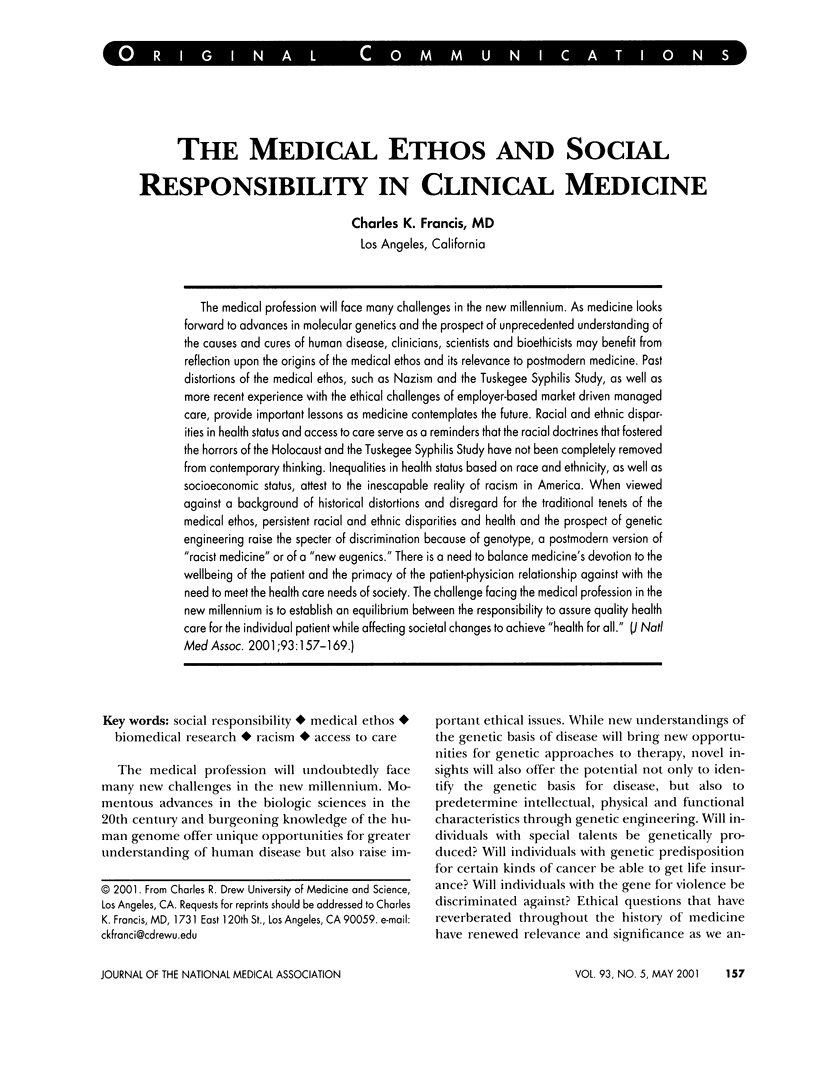
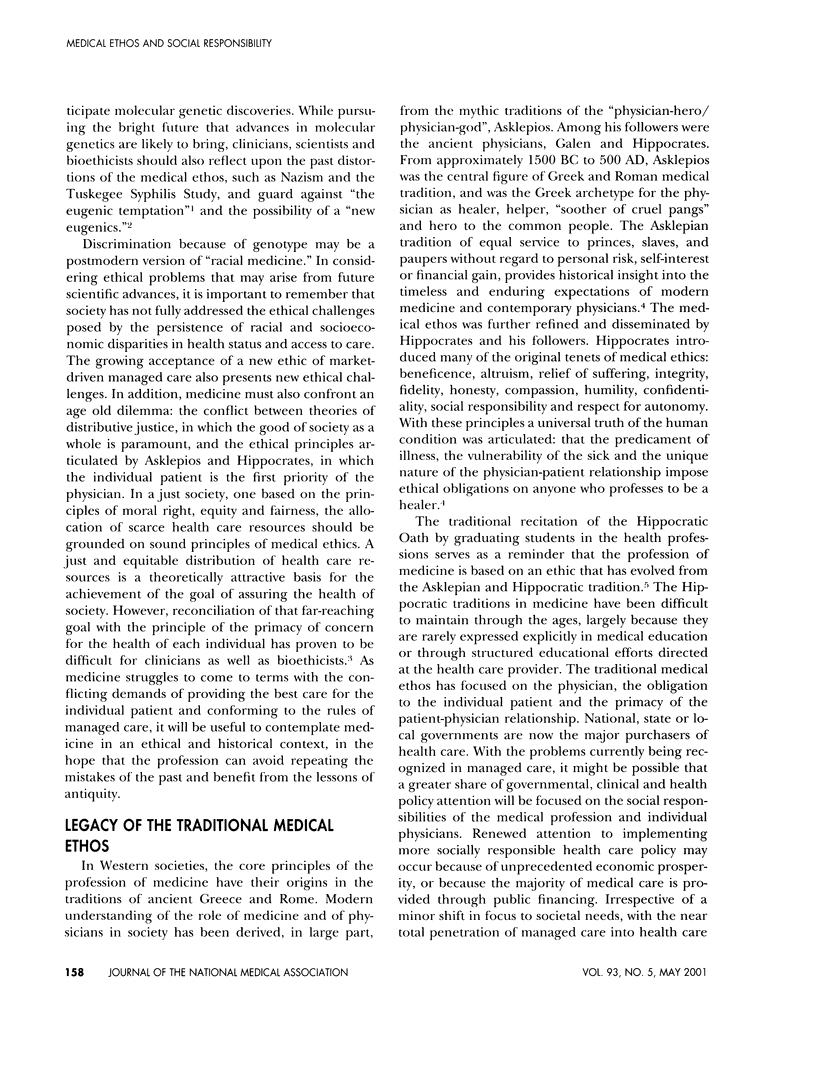
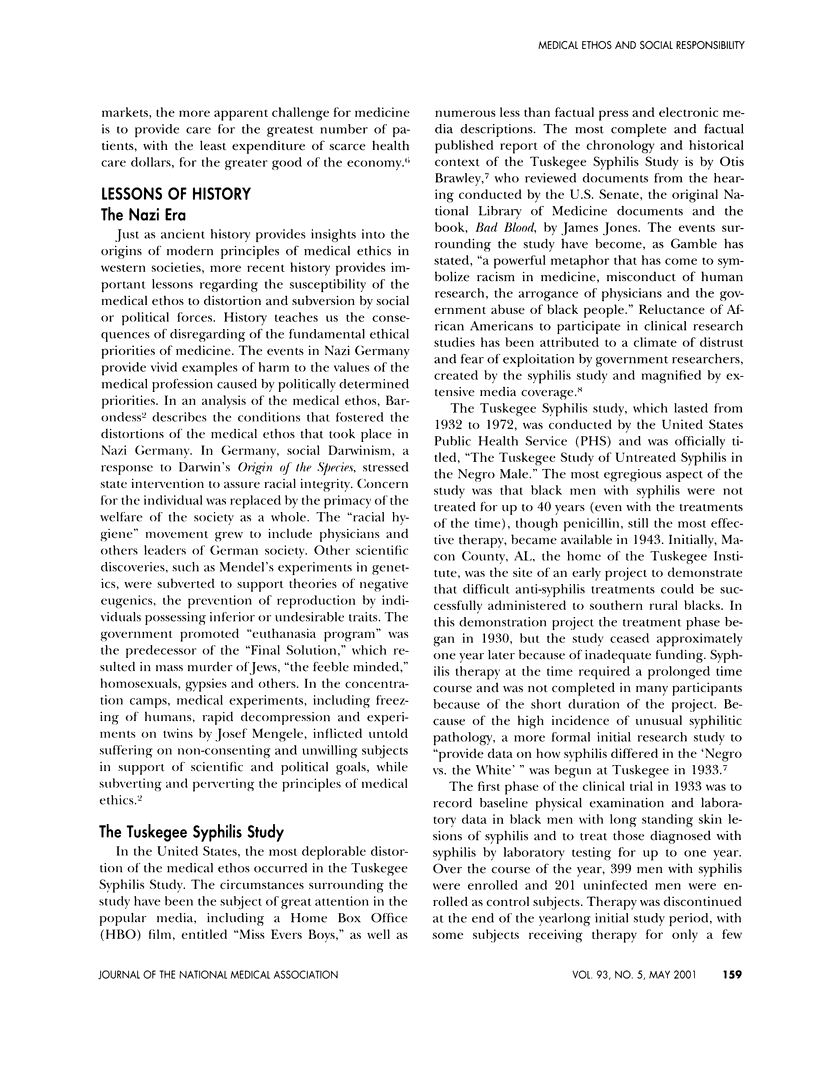
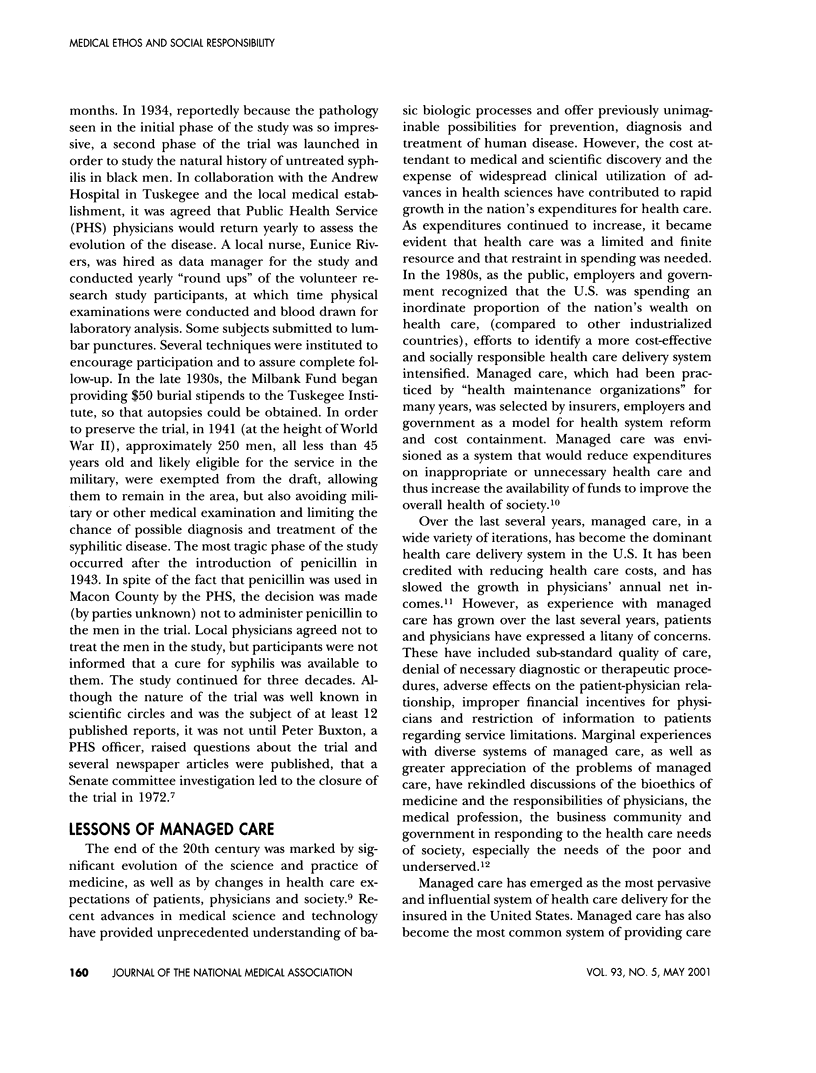
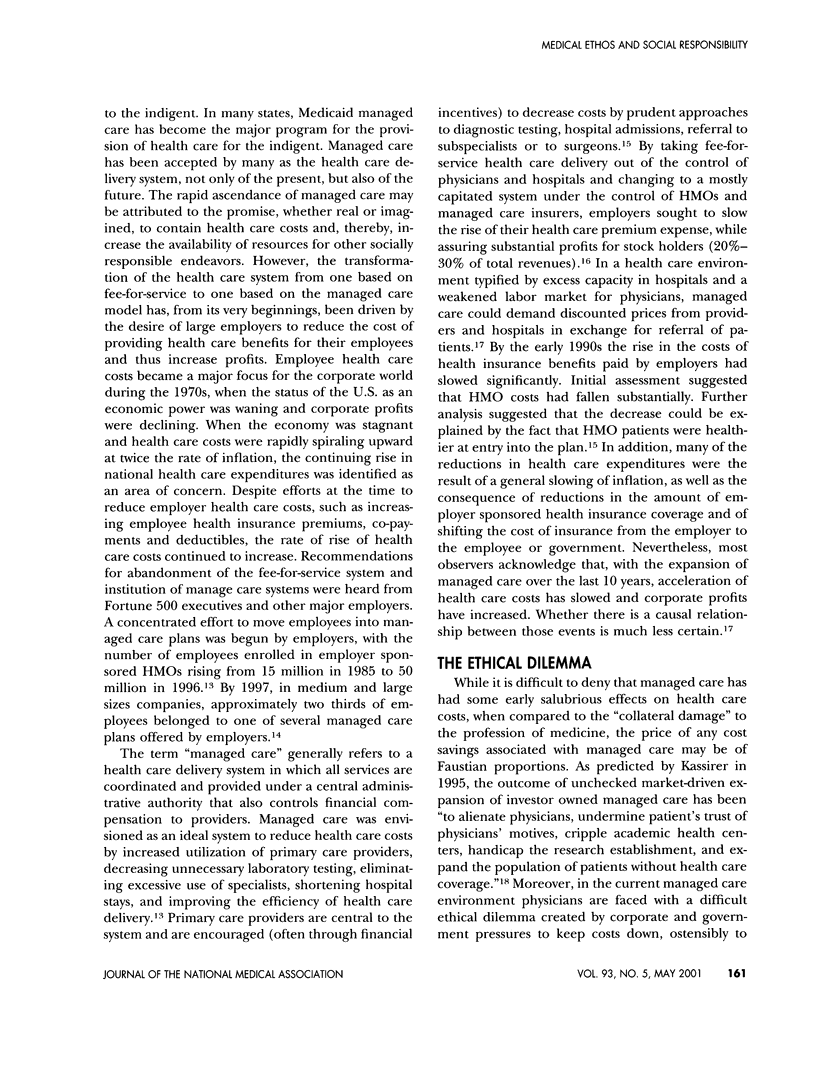
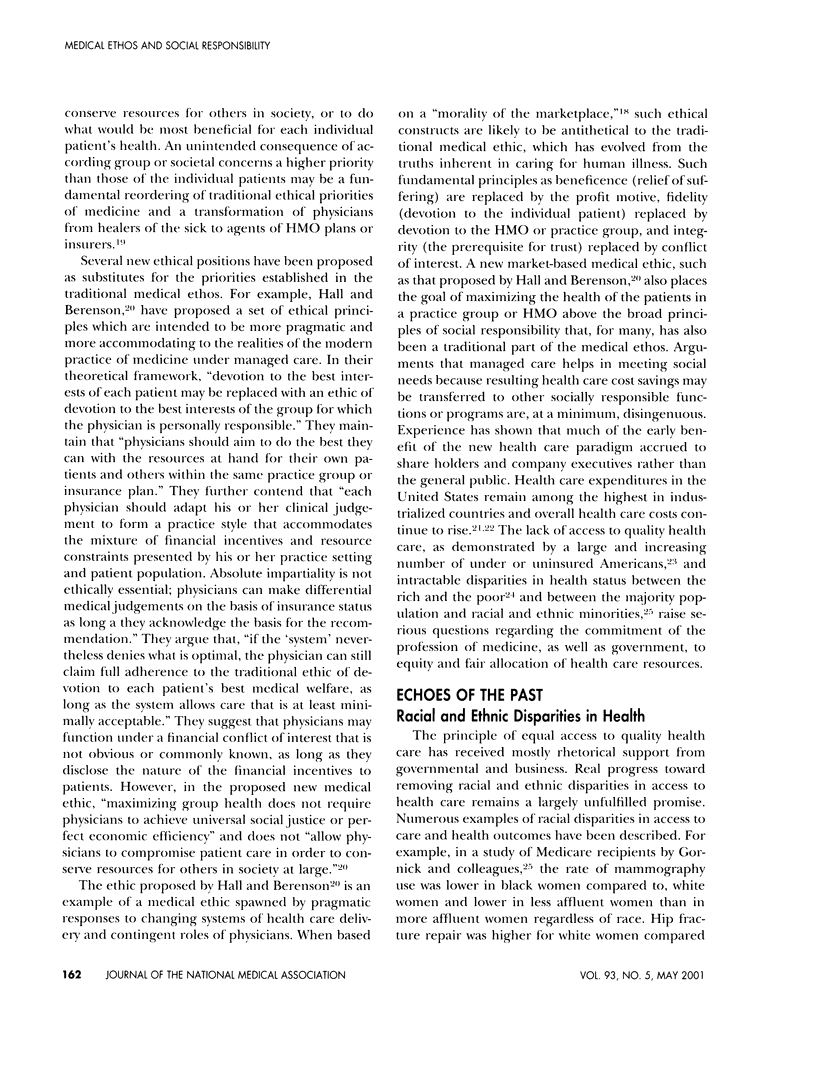
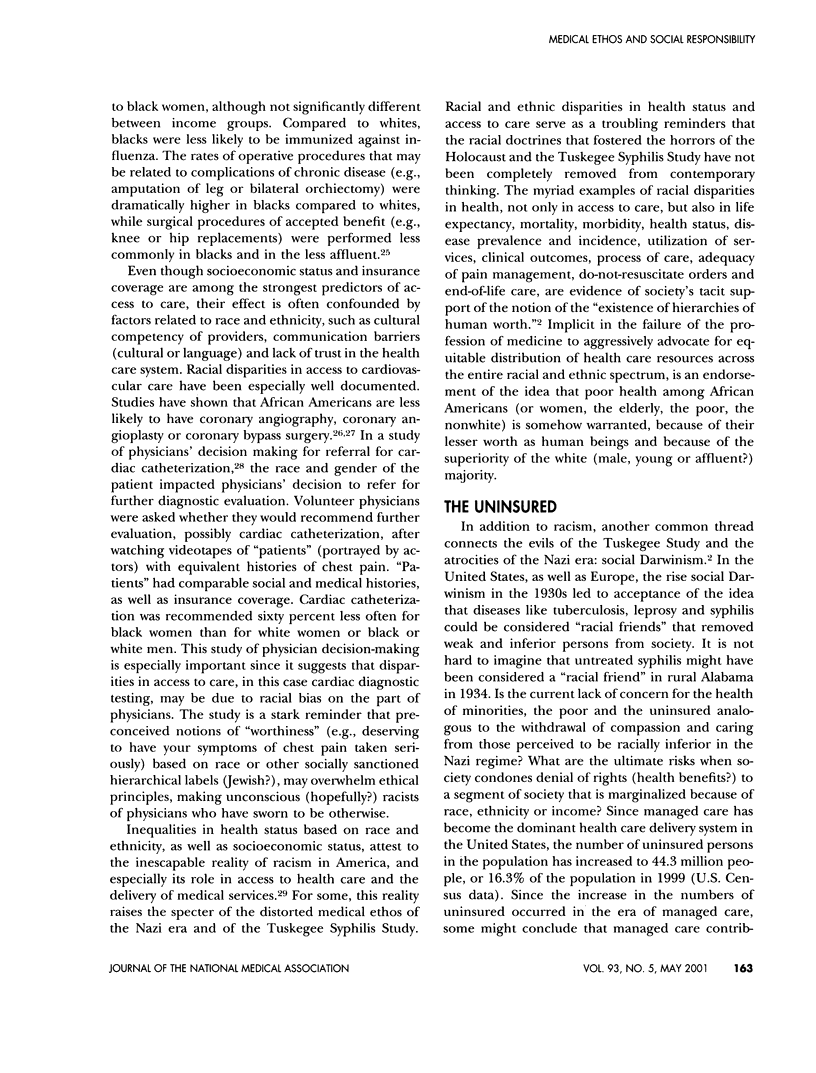
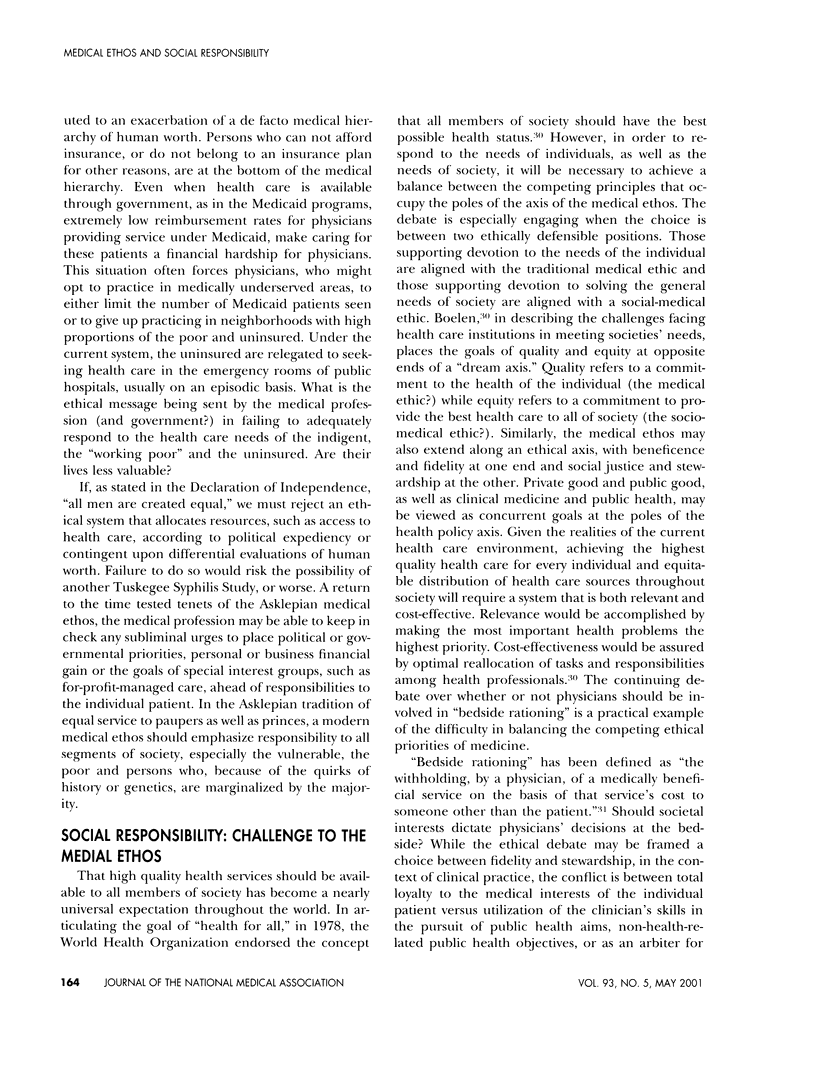
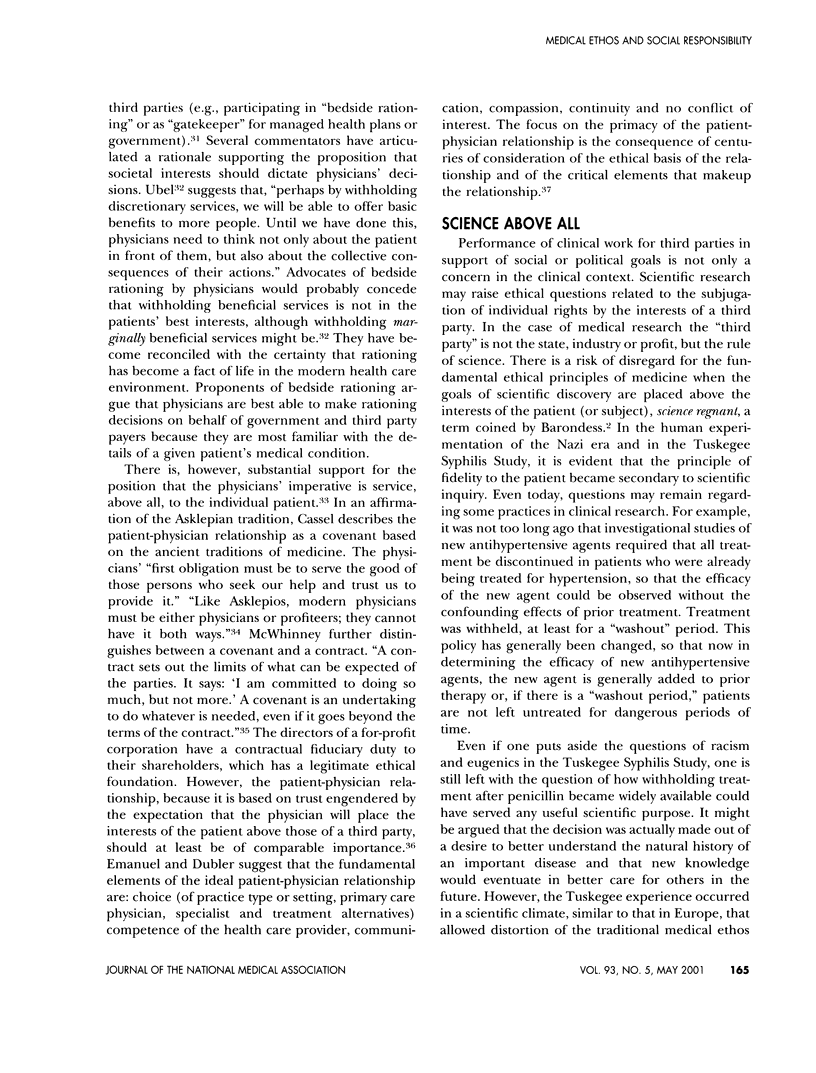
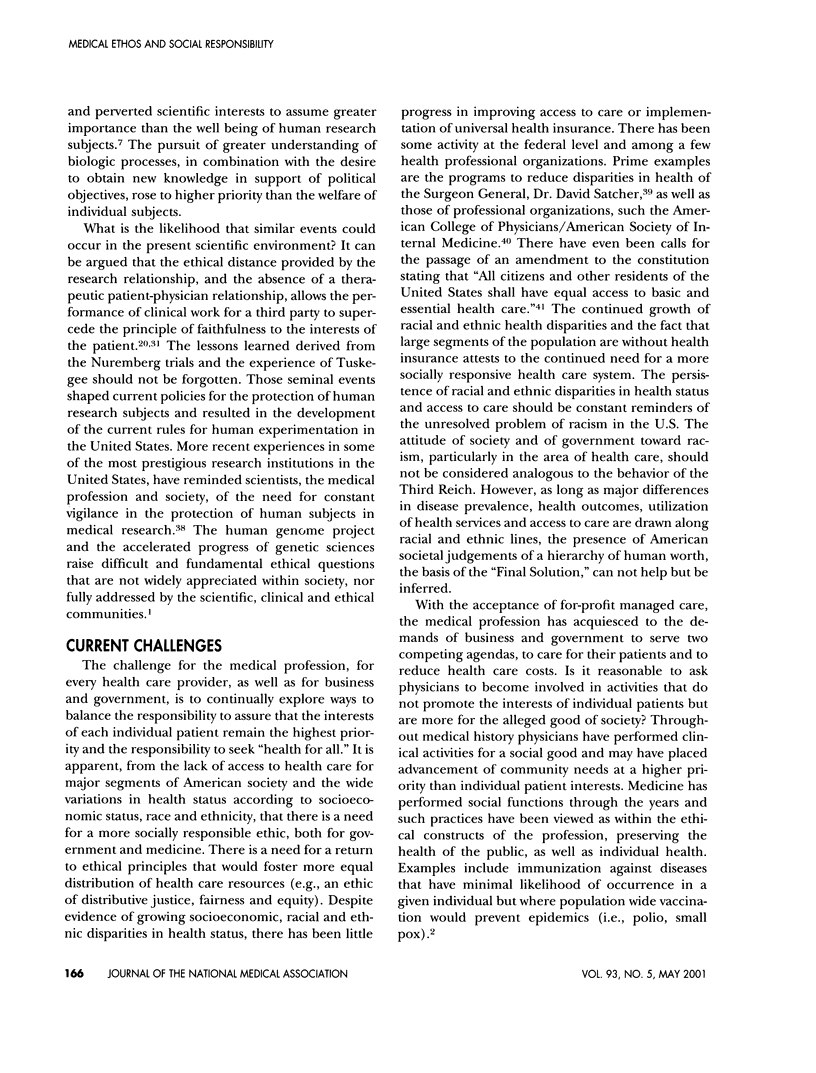
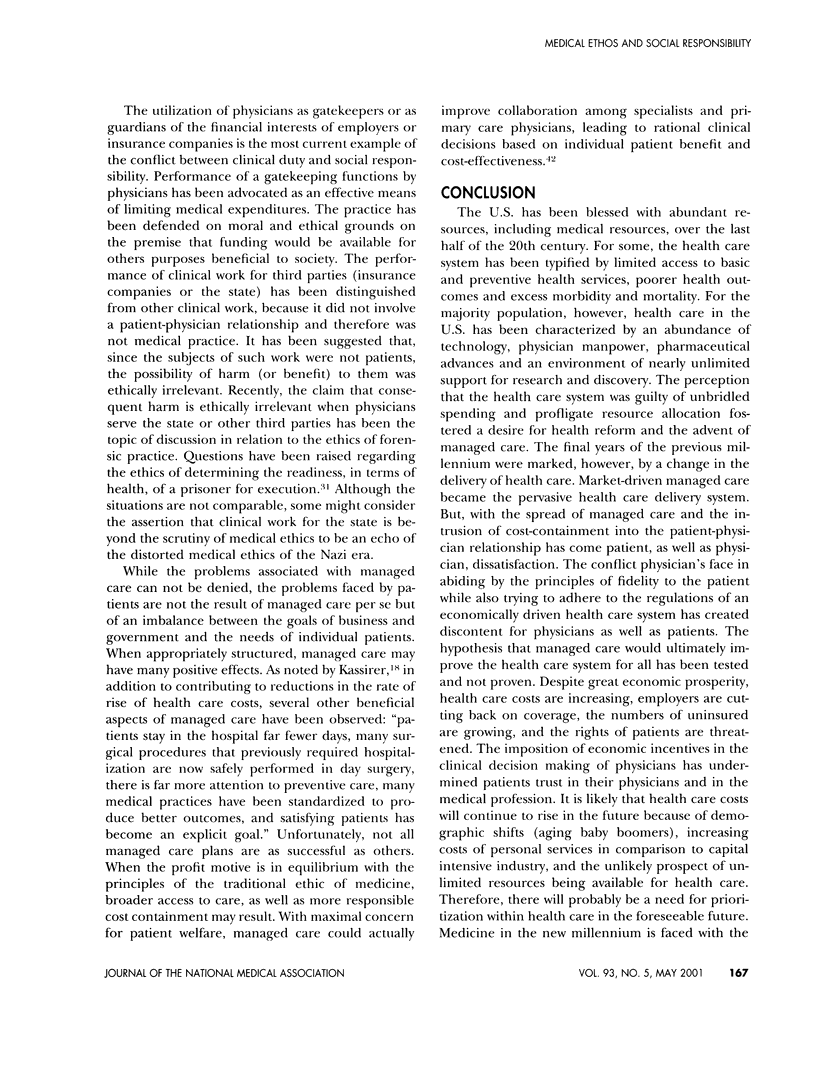

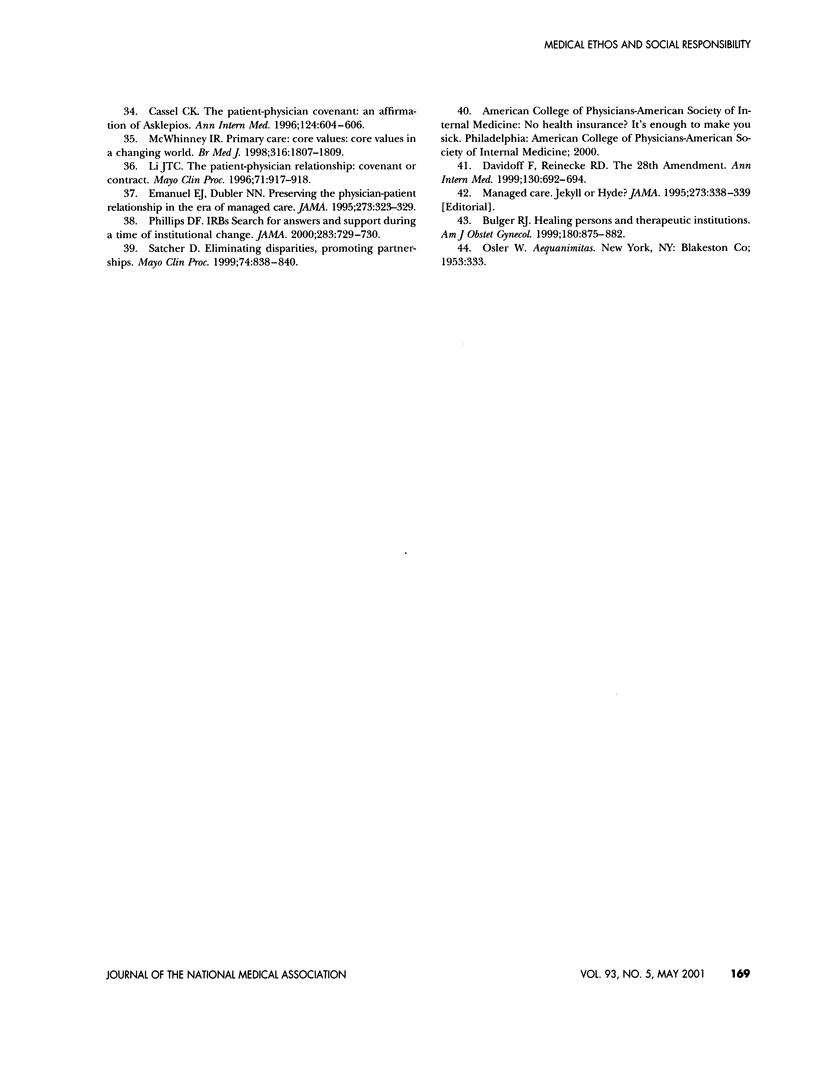
Selected References
These references are in PubMed. This may not be the complete list of references from this article.
- Barondess J. A. Care of the medical ethos: reflections on Social Darwinism, racial hygiene, and the Holocaust. Ann Intern Med. 1998 Dec 1;129(11):891–898. doi: 10.7326/0003-4819-129-11_part_1-199812010-00010. [DOI] [PubMed] [Google Scholar]
- Bloche M. G. Clinical loyalties and the social purposes of medicine. JAMA. 1999 Jan 20;281(3):268–274. doi: 10.1001/jama.281.3.268. [DOI] [PubMed] [Google Scholar]
- Blumenthal D. Health care reform at the close of the 20th century. N Engl J Med. 1999 Jun 17;340(24):1916–1920. doi: 10.1056/NEJM199906173402412. [DOI] [PubMed] [Google Scholar]
- Bodenheimer T., Sullivan K. How large employers are shaping the health care marketplace. First of two parts. N Engl J Med. 1998 Apr 2;338(14):1003–1007. doi: 10.1056/NEJM199804023381422. [DOI] [PubMed] [Google Scholar]
- Bodenheimer T. The American health care system--physicians and the changing medical marketplace. N Engl J Med. 1999 Feb 18;340(7):584–588. doi: 10.1056/NEJM199902183400725. [DOI] [PubMed] [Google Scholar]
- Boelen C. Adapting health care institutions and medical schools to societies' needs. Acad Med. 1999 Aug;74(8 Suppl):S11–S20. doi: 10.1097/00001888-199908000-00024. [DOI] [PubMed] [Google Scholar]
- Brawley O. W. The study of untreated syphilis in the negro male. Int J Radiat Oncol Biol Phys. 1998 Jan 1;40(1):5–8. doi: 10.1016/s0360-3016(97)00835-3. [DOI] [PubMed] [Google Scholar]
- Bulger R. J. Healing persons and therapeutic institutions. Am J Obstet Gynecol. 1999 Apr;180(4):875–882. doi: 10.1016/s0002-9378(99)70658-7. [DOI] [PubMed] [Google Scholar]
- Cassel C. K. The patient-physician convenant: an affirmation of asklepios. Ann Intern Med. 1996 Mar 15;124(6):604–606. doi: 10.7326/0003-4819-124-6-199603150-00010. [DOI] [PubMed] [Google Scholar]
- Davidoff F., Reinecke R. D. The 28th Amendment. Ann Intern Med. 1999 Apr 20;130(8):692–694. doi: 10.7326/0003-4819-130-8-199904200-00018. [DOI] [PubMed] [Google Scholar]
- Emanuel E. J., Dubler N. N. Preserving the physician-patient relationship in the era of managed care. JAMA. 1995 Jan 25;273(4):323–329. [PubMed] [Google Scholar]
- Gamble V. N. Under the shadow of Tuskegee: African Americans and health care. Am J Public Health. 1997 Nov;87(11):1773–1778. doi: 10.2105/ajph.87.11.1773. [DOI] [PMC free article] [PubMed] [Google Scholar]
- Geiger H. J. Annotation: racism resurgent--building a bridge to the 19th century. Am J Public Health. 1997 Nov;87(11):1765–1766. doi: 10.2105/ajph.87.11.1765-a. [DOI] [PMC free article] [PubMed] [Google Scholar]
- Gillum R. F., Gillum B. S., Francis C. K. Coronary revascularization and cardiac catheterization in the United States: trends in racial differences. J Am Coll Cardiol. 1997 Jun;29(7):1557–1562. doi: 10.1016/s0735-1097(97)00089-2. [DOI] [PubMed] [Google Scholar]
- Ginzberg E., Ostow M. Managed care--a look back and a look ahead. N Engl J Med. 1997 Apr 3;336(14):1018–1020. doi: 10.1056/NEJM199704033361411. [DOI] [PubMed] [Google Scholar]
- Goodman M. Ethical issues in health care rationing. Nurs Manag (Harrow) 1998 Jul;5(4):29–33. doi: 10.7748/nm.5.4.29.s14. [DOI] [PubMed] [Google Scholar]
- Gornick M. E., Eggers P. W., Reilly T. W., Mentnech R. M., Fitterman L. K., Kucken L. E., Vladeck B. C. Effects of race and income on mortality and use of services among Medicare beneficiaries. N Engl J Med. 1996 Sep 12;335(11):791–799. doi: 10.1056/NEJM199609123351106. [DOI] [PubMed] [Google Scholar]
- Hall M. A., Berenson R. A. Ethical practice in managed care: a dose of realism. Ann Intern Med. 1998 Mar 1;128(5):395–402. doi: 10.7326/0003-4819-128-5-199803010-00009. [DOI] [PubMed] [Google Scholar]
- Iglehart J. K. The American health care system--expenditures. N Engl J Med. 1999 Jan 7;340(1):70–76. doi: 10.1056/NEJM199901073400122. [DOI] [PubMed] [Google Scholar]
- Kassirer J. P. Managed care and the morality of the marketplace. N Engl J Med. 1995 Jul 6;333(1):50–52. doi: 10.1056/NEJM199507063330110. [DOI] [PubMed] [Google Scholar]
- Kassirer J. P. Managing care--should we adopt a new ethic? N Engl J Med. 1998 Aug 6;339(6):397–398. doi: 10.1056/NEJM199808063390608. [DOI] [PubMed] [Google Scholar]
- Kassirer J. P. Our endangered integrity--it can only get worse. N Engl J Med. 1997 Jun 5;336(23):1666–1667. doi: 10.1056/NEJM199706053362308. [DOI] [PubMed] [Google Scholar]
- Kuttner R. The American health care system. Health insurance coverage. N Engl J Med. 1999 Jan 14;340(2):163–168. doi: 10.1056/NEJM199901143400226. [DOI] [PubMed] [Google Scholar]
- Lamm R. D. Marginal medicine. JAMA. 1998 Sep 9;280(10):931–933. doi: 10.1001/jama.280.10.931. [DOI] [PubMed] [Google Scholar]
- Light D. W. Good managed care needs universal health insurance. Ann Intern Med. 1999 Apr 20;130(8):686–689. doi: 10.7326/0003-4819-130-8-199904200-00016. [DOI] [PubMed] [Google Scholar]
- Light D. W. Managed care: false and real solutions. Lancet. 1994 Oct 29;344(8931):1197–1199. doi: 10.1016/s0140-6736(94)90512-6. [DOI] [PubMed] [Google Scholar]
- Loewy E. H., Loewy R. S. Ethics and managed care: reconstructing a system and refashioning a society. Arch Intern Med. 1998 Dec 7;158(22):2419–2422. doi: 10.1001/archinte.158.22.2419. [DOI] [PubMed] [Google Scholar]
- McWhinney I. R. Primary care: core values. Core values in a changing world. BMJ. 1998 Jun 13;316(7147):1807–1809. doi: 10.1136/bmj.316.7147.1807. [DOI] [PMC free article] [PubMed] [Google Scholar]
- Pappas G., Queen S., Hadden W., Fisher G. The increasing disparity in mortality between socioeconomic groups in the United States, 1960 and 1986. N Engl J Med. 1993 Jul 8;329(2):103–109. doi: 10.1056/NEJM199307083290207. [DOI] [PubMed] [Google Scholar]
- Pellegrino E. D., Caplan A., Goold S. D. Doctors and ethics, morals and manuals. Ann Intern Med. 1998 Apr 1;128(7):569–571. doi: 10.7326/0003-4819-128-7-199804010-00010. [DOI] [PubMed] [Google Scholar]
- Peterson E. D., Shaw L. K., DeLong E. R., Pryor D. B., Califf R. M., Mark D. B. Racial variation in the use of coronary-revascularization procedures. Are the differences real? Do they matter? N Engl J Med. 1997 Feb 13;336(7):480–486. doi: 10.1056/NEJM199702133360706. [DOI] [PubMed] [Google Scholar]
- Phillips D. F. IRBs search for answers and support during a time of institutional change. JAMA. 2000 Feb 9;283(6):729–730. doi: 10.1001/jama.283.6.729. [DOI] [PubMed] [Google Scholar]
- Satcher D. Eliminating disparities, promoting partnerships. Mayo Clin Proc. 1999 Aug;74(8):838–840. doi: 10.4065/74.8.838. [DOI] [PubMed] [Google Scholar]
- Schulman K. A., Berlin J. A., Harless W., Kerner J. F., Sistrunk S., Gersh B. J., Dubé R., Taleghani C. K., Burke J. E., Williams S. The effect of race and sex on physicians' recommendations for cardiac catheterization. N Engl J Med. 1999 Feb 25;340(8):618–626. doi: 10.1056/NEJM199902253400806. [DOI] [PubMed] [Google Scholar]
- Smith S., Freeland M., Heffler S., McKusick D. The next ten years of health spending: what does the future hold? The Health Expenditures Projection Team. Health Aff (Millwood) 1998 Sep-Oct;17(5):128–140. doi: 10.1377/hlthaff.17.5.128. [DOI] [PubMed] [Google Scholar]
- Ubel P. A., Goold S. Does bedside rationing violate patients' best interests? An exploration of "moral hazard". Am J Med. 1998 Jan;104(1):64–68. doi: 10.1016/s0002-9343(97)00172-1. [DOI] [PubMed] [Google Scholar]


